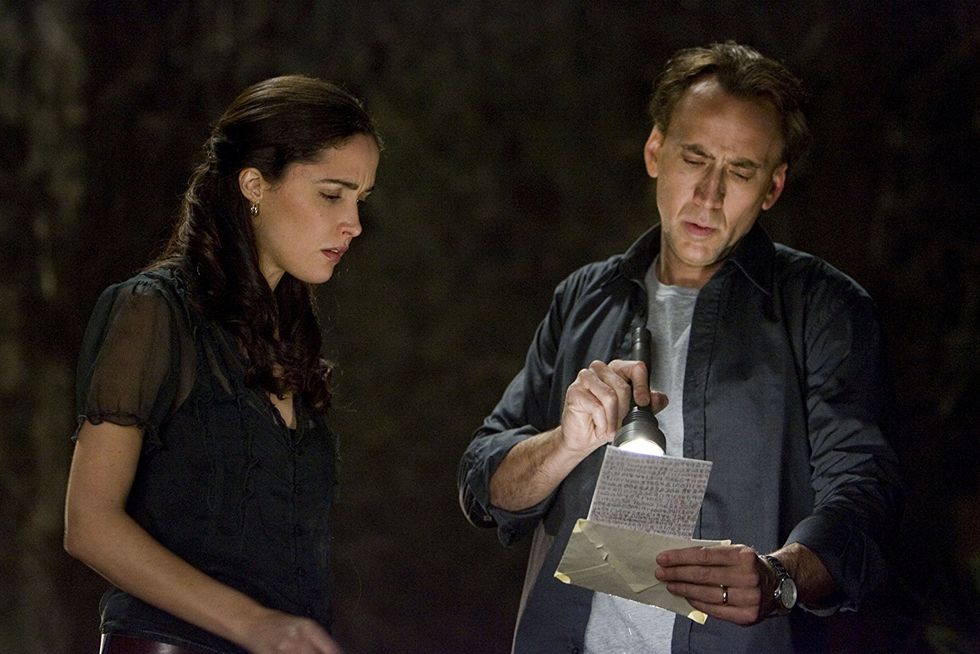“I always thought you were supposed to sense when the people you love are in danger, but I didn’t feel anything. Nothing. I was just blowing leaves off the lawn.” ~ John Koestler/Nicholas Cage
The phrase “starring Nicholas Cage” is often met with groans of despair or amused snickers. And with good reason. With scenes such as this beautiful gem, it’s too easy to make fun of Nicholas Cage’s career. (Yet, he still has the same number of Oscars as Leonardo di Caprio and more than Samuel L. Jackson.)
So when my brother asked one afternoon, “Do you want to watch a dumb Nicholas Cage movie?” My eyebrows raised with warranted skepticism.
“What film?” I responded.
“Knowing.”
I shrugged and agreed. It wasn’t like I had anything better to do, and a little mindless entertainment never hurt anyone. We pulled up the movie on Netflix, hit play, and I settled into the couch not “knowing” what to expect.
It’s 1959 in a Massachusetts elementary school. Recess. Though most kids are busy chasing each other or playing hopscotch, little Lucinda Embry is special. She stares at the midday sun listening to the voices whispering in her head. After recess ends and everyone is in the classroom, Lucinda’s school teacher Miss Taylor explains that they’re going to make a time capsule, which will contain drawings of what the students imagine the future to be. While her classmates doodle stick figures on the moon or square-shaped flying cars, Lucinda furiously writes numbers like she’s possessed by a demon. Miss Taylor interrupts Lucinda, exasperated that the young girl hasn’t followed instructions, but nevertheless includes the strange numerical sequence in the time capsule.
50 years later. Professor John Koestler, or as I just called him for the entire film, “Nicholas Cage,” is feeling a bit fatalistic. An astrophysicist who has decided that life is only a string of random accidents after his wife tragically perishes in a fire, struggles to connect with his reserved but genius son Caleb (Chandler Canterbury). The father-son relationship is awkward and stiff, seemingly limited to the phrases “do your homework.” Caleb’s elementary school is holding a big celebration to honor the opening of a time capsule. The giant silver container that looks more like an unexploded Cold War missile than a time capsule is placed center stage. The kids rush forward to receive their envelope and rip them open, but Caleb is perplexed when all his letter has is a series of random numbers. He takes it home with him. Later that evening, Nicholas Cage notices an unusual sequence: 9-1-1-0-1-2-9-9-6. The day, month, year, and death toll for the 9/11 attacks. He spends the night poring over the rest of the numbers, and discovers that they correspond with horrific human events…and foretell of more to come. Nicholas Cage’s life is turned upside-down (in a Stranger Things sense) as he tries to prevent imminent world peril. Flaming elks, black rocks, and bleach-blonde mysterious stalkers stand in his path, but Nicholas Cage is determined to figure it all out before his number is up.
I was surprised by how much I enjoyed the film. Just the name “Nicholas Cage” made me think going into this film that I was going to be banging my head against the wall by time it was over. Instead, I was intrigued the whole way through. Knowing doesn’t excel in one particular area of the science fiction genre—visually like Inception (2010), nostalgically like Super 8 (2011), or philosophically like Interstellar (2014)—but its moody atmosphere generates enough horror and mystery to keep it interesting. It even has a couple terrific action moments involving an airplane in one scene and a subway in another that have spectacular cinematography
I was probably more surprised to learn that back in 2009, Knowing was one of the most derided films of the year, squeaking out a 34% approval rating on Rotten Tomatoes. I agree that Knowing is no national treasure, but the acting (yes, even Nicholas Cage) is good minus a couple cheesy lines, the plotline is never boring, and there a few action sequences that quite impressive. From what I’ve seen online, it sounds like if people hated the film, it was because they thought the ending was too random and a propaganda piece for Christian theology. I didn’t get that impression at all. The ending is something you accept or you don’t (I’m not going to spoil anything here), but I thought it was a continuation of the running theme concerning determinism versus free will. As for the religious aspect, while the film is certainly indebted to Christian elements, I thought the ending was actually a subversion of popular Christian (specifically Catholic from my upbringing) belief because it hovered somewhere just about nihilistic.
Knowing is a film that is not going to be something you feel compelled to watch again and again. The entertainment factor is high enough that you don’t think you wasted two hours, and besides, it’s kind of nice to see Nicholas Cage in a good role for once.
Rating: B | 3 stars





















